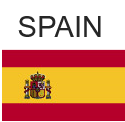This table here below aims at providing an overview of all the initiatives, such as the political communications, guidelines, and legislation, related to interoperability that have been put in place in Spain.

National Interoperability Framework
The National Interoperability Framework (NIF) is a set of standards, policies, and guidelines that ensure that information and communication technology (ICT) systems can communicate and share data seamlessly. It promotes the development of interoperable systems that facilitate data exchange and collaboration between different organizations and levels of government. The NIF provides a common language and a framework for ensuring that ICT solutions are compatible, secure, and reliable, which enhances the efficiency of public services and improves citizen outcomes.
|
National Interoperability Framework Year: 2010 |
The interoperability framework is a set of standards and guidelines aimed at ensuring the provision of services for public administration institutions, enterprises and citizens both in the national and the European context. In Spain it is regulated by Royal Decree 4/2010, of 8 January 2010. |
Good Practices
This section provides examples at the national level in line with a selection of different thematic areas of the European Interoperability Framework (EIF). Further initiatives and good practices are available in the country’s Digital Public Administration Factsheet.
Data portability mainly relies on standardisation, as established in Law 40/2015. It is also relevant to mention in this regard the Interoperability Technical Standards for the processing and preservation of databases, for the preservation of electronic documentation, for then Transfer and Entry of electronic documents and records, and for the reuse of information resources. By Order ETD/803/2020 of July 31, the Data Office was created to design strategies and frameworks for data management, governance policy, development of a data analytics competence centre and coordination of technical initiatives. In November 2022, the datos.gob.es portal published a guide to develop a plan of measures to promote openness and reuse of open data. The goal is to provide guidance on the different elements that the plan should contain in order to draw up a feasible roadmap for data opening, as well as to enable its monitoring and evaluation, which consider portability. For data portability at cross-border level, it is required to adopt standards and common specifications that are set up at the European level. In this regard, Spain is an active participant in the European working groups for semantic interoperability and uses those agreed at the European level for the data portability across borders related to several European information systems.
Along with the simplification of administrative processes, the Spanish NIF and legislation establish the mandate to use common services and infrastructures as well as reusable solutions, except for exceptional cases properly justified with an economic assessment. This mandate was mainly justified on behalf of the return of investments, total cost of ownership, and risk reduction provided by reusability. On the other hand, the Spanish NIF and Law 40/2015 on the Legal Regime for the Public Sector also establish the principle of interoperability-by-default for their IT solutions since it enables the collaborative provision of public services with a significant reduction of administrative burden thus improving user satisfaction and user centricity. Comprehensive information of these reusable assets can be found in the Centre of Technology Transfer (CTT) portal (reusability). For those CTT solutions that wish to build a development community around their open-source project, the Forge-CTT space has been created within the large public collaborative environment of GitHub, where public administrations can create and manage their repositories and foster collaboration with both the public and private sectors (user satisfaction and user centricity). Royal Decrees 311/2022 and 4/2010 set up the obligation to be compliant with the security and national interoperability frameworks, providing audit guidelines to ease the understanding of their assessment and audit requirements (reusability, risks).
As established by Article 8 of the Spanish NIF, services, data and documents of any public administration should be electronically accessible by any public unit, preferably under cooperation agreements that reflect the requirements and conditions of access and through interoperability nodes. The technical body for the cooperation governance is the Sectorial Commission on Electronic Administration, as Law 40/2015 establishes. This Commission is composed by public administrations of every level and universities. It is responsible for (a) ensuring the compatibility and interoperability of the systems and applications used by public administrations; (b) boosting the development of the Spanish eGovernment; and (c) ensuring cooperation between public administrations in order to provide precise, updated and unambiguous administrative information. This Commission has 14 active working groups focused on promoting and enhancing the progress of the Spanish eGovernment in several context. Also, the National Security Framework regulated by Royal Decree 311/2022 must be applied by the entities of the public sector in Spain and also applies to the information systems of private sector entities, including the obligation to have the security policy referred to, when, in accordance with the applicable regulations and by virtue of a contractual relationship, they provide services or provide solutions to public sector entities for the exercise by them of their administrative powers and competencies. Among the security operational measures included in the ENS are explicitly mentioned the develop of a change management plan and a business continuity/disaster recovery plan, and therefore are mandatory for the public services.
In Spain, regulatory impact reports are issued for every legislation draft to analyse the ticked issues, also considering administrative simplification with digital proceedings. On the other hand, there is an extensive set of ground legislation for eGovernment, compiled in the called "eGovernment Code", whose mandatory compliance ensures proper management of potential digital barriers, reuse of solutions, compliance with applicable national, European and international mandates, as well as the design of processes and procedures accordingly.
The use of shared infrastructures and reusable services is forced by the Spanish legislation. Some of the provisions include:
- the Data Intermediation Platform (PID) that enables the exchange of data between public services and base registries for the implementation of the Once-Only principle;
- INSIDE that enables the sharing of administrative e-documents and e-files;
- SIR that enables the exchange of entry registry record among different competent authorities and public administrations;
- NOTIFICA that can be used by competent authorities to send communications and notifications to citizens and business;
- the datos.gob.es portal, a federated platform at national level whose source code is available in Github for reuse.
The Spanish Centre of Technology Transfer (CTT) is, according to Law 40/2015 article 158, a public repository that contains all the reusable assets for IT solutions whose objective is to promote the reuse of solutions by all public administrations. In addition, the CTT provides a space reserved in GITHUB, CTT Forge, where the collaborative development of applications of public administrations is facilitated. Any administration can publish its software project and create a development community around it. The CTT portal provides information on projects, services, semantic assets, regulations and solutions that are being developed in the field of e-Government.
In Spain, building blocks are used as cloud services to provide access to base registries, digital identification, digital signing, and digital payment. There is also a shared service to provide telecom services through a unified and consensual public contract at the central administration level. Moreover, most of the public organisations use social media channels such as twitter and provide open data. A building block that offers an open-source application to create open data portals has been established, but the national open data portal, datos.gob.es, can be directly use by any public administration. Specific programmes to adopt IoT technologies in municipalities in order to provide better public services also can be found.

